
A Publication of Macalester’s
Environmental Studies Department
October 2021
![]()
Letter From the Chair
Dear Friends of Environmental Studies,
It is so great to be back on campus and have our classes in person again. After a long year of online learning, we are enjoying field trips, EnviroThursday lectures, and hanging in Olin Rice after a long hiatus.
We also welcomed three new visiting faculty to our department this Fall: Anika Bratt, Sylvia Cifuentes, and Stotra Chakrabarti. They bring lots of exciting classes, research approaches and global perspectives to our department. Look for their stories below.
We had 21 students graduate in May 2021. Of the 2021 graduates, 7 had interdisciplinary emphases and 14 had disciplinary emphases. I want to extend a special congratulations to our graduating seniors Sasha Lewis-Norelle, Kori Suzuki and Sabine Peterka, who were acknowledged by the department for their contributions over their four years at Macalester. Sasha and Kori were awarded the Environmental Studies Citizenship Award and Sabine was awarded the Environmental Scholarship Award. They have left an indelible mark on our community.
We are at an all time high with 101 majors and minors in our department. While its exciting to see so many students drawn to the ES major, its also an important time for reflection on how we are supporting students and creating a sense of community and belonging. In this spirit, we created a new position for an anti-racism student fellow in our department. This effort was spearheaded by Prof. Christine O’Connell. Rachel Percy was our first fellow in Spring 2021. Her work is being carried on in the 2021-22 academic year by Dheera Yalamanchili. Their work has included creating an affinity group for BIPOC students and starting a mentoring program within our major.
I enjoyed dipping back into my research this past summer on the future of the Mississippi River. It was gratifying to have a summer research lab up the running again, with the help of students Alexandra Jabbarpour, Rebecca Driker-Ohren and Zella Lobo. You can read more about our Dear River project in this Mac Today story.
As always, keep us updated on your exciting news. Please drop in on us if you find yourselves in the neighborhood.
Roopali Phadke
Chair, Environmental Studies
![]()
Environmental Studies Student Award Winners
The 2021 Environmental Studies Student Award winners are:
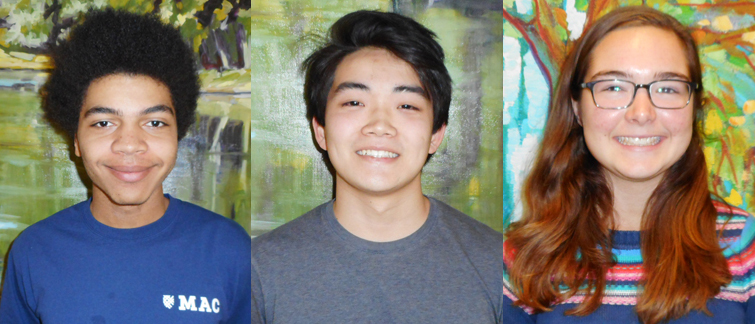
Environmental Studies Citizenship Award Winners – Sasha Lewis-Norelle and Kori Suzuki
Environmental Studies Scholarship Winner – Sabine Peterka
These Environmental Studies majors also won awards in 2021:
- Luca de Graf ’21—Ann Bolger Vision Award
- Alison Bautista ’21—Hamre Award
- Kori Suzuki ’21—Presidential Leadership Award
- Aleah Wong ’22—Gateway Prize Winner for Excellent Writing (Natural Sciences)
- Sabine Peterka ’21—Gateway Prize Winner for Excellent Writing (Fine Arts)
- Daniel Westhoven ’21—Gateway Prize Winner for Excellent Writing (Social Science)
![]()
Year in Photos
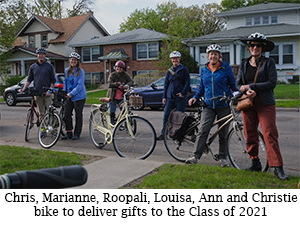
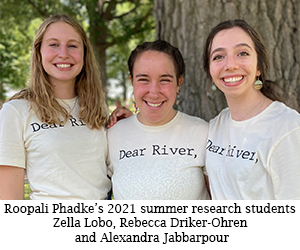
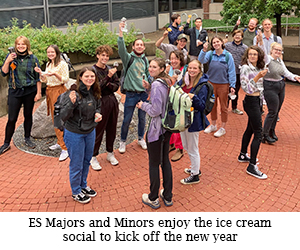
![]()
Sustainability Update
By Alyssa Erding
In January 2020, the Sustainability Office was reorganized into the academic line and Dr. Christie Manning stepped into the newly created Director of Sustainability role. With this transition came an emphasis on curricular and co-curricular programming to support sustainability education at Macalester, including a summer internship program that pays students to work with local organizations focused on climate justice, support for faculty members who wish to add sustainability content to their classes, grant writing, and more. For the fall of 2021, Christie is on academic sabbatical and Amy Damon, Professor of Economics, is serving as the Interim Director of Sustainability. In addition to our sustainability-related curricular support, we have maintained and strengthened our sustainable operations through the implementation of new projects and updating of existing programs, like a new fleet of bicycles for the college bike share program, the addition of a semester-long bike share program, introduction of reusable to-go containers in Cafe Mac, remodeling of the Free Swap, and hosting an event series around the circular economy and reuse and repair. Along with the recent divestment commitments by the Board of Trustees, we are working with the Investments Office to assist with the goal of creating more transparency around the college’s endowment. Our efforts continue to pay off: in 2021 we increased our rating by the Sustainability Tracking, Assessment, and Rating System by nearly 10 points, we were listed in the Sierra Club top 100 colleges, and ranked first in the nation for our institution size in Campus Race to Zero Waste. Through all of this and more, we have worked closely with a number of departments on campus, including Facilities Services, the Library, Entrepreneurship and Innovation, Bon Appetit, Center for Student Life, and more. In both our curricular and operational endeavors, the Sustainability Office is dedicated to approaching the work it does through the lens of environmental justice and care for all communities, human and non-human.
![]()
EnviroThursdays
There were 8 EnviroThursday presentations during the 2020-21 school year with with over 473 in attendance. These presentations were all held via Zoom.
- “Observing the Observer: Challenging the Madelorian Ethic of University Interventions in Disasters” by Dr. Marla Perez Lugo and Dr. Cecilio Ortiz Garcia, Hubert Humphrey Distinguished Visiting Professors, Macalester Environmental Studies Department
- “2020-2021 Smail Gallery Exhibition Opening: Resilience” by Kori Suzuki ’21
- “First 100 Days” by a panel of Macalester community members
- “What’s Soil Got to Do With Climate Change” by Dr. Asmeret Asefaw Berhe, Professor of Soil Biogeochemistry, and Falasco Chair in Earth Sciences at the Department of Life and Environmental Sciences, University of California, Merced
- “Restoration and Reciprocity” by Robin Wall Kimmerer, author of Braiding Sweetgrass: Indigenous Wisdom, Scientific Knowledge and the Teachings of Plants
- “Upstream Oil Production, Ambient Air Quality, and Reproductive Health Equity in California” by David J.X. Gonzalez, PhD candidate, Emmett Interdisciplinary Program in Environment and Resources at Stanford University
- “Farming the Floodplain: Gendered Surplus People and Maladaptation to Climate Change in Northern Ghana” by Dr Hanson Nyantakyi-Frompong, Assistant Professor, Department of Geography and the Environment, University of Denver
- “Root and Branch: Climate Migration, Racial Crises, and the History and Future of Climate Justice” by Maxine Burkett, JD, Professor of Law, William S. Richardson School of Law, University of Hawai‘i at Mānoa
You can read more about these presentations on the EnviroThursday home page. Click on the Fall 2020 and Spring 2021 links. EnviroThursdays take place every Thursday during the school year in Olin-Rice 250 at 12 noon.
![]()
Environmental Studies Faculty News
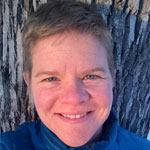 Prof. Louisa Bradtmiller
Prof. Louisa Bradtmiller
In Fall 2020 Louisa taught online versions of Earth’s Climate System and Climate Change: Science, Economics, and Policy, co-taught with Sarah West (Econ). In the spring semester she taught Paleoclimate, which had a few labs in person (!), and a new course called Science for a Sustainable Future. While she didn’t love online teaching, Louisa appreciated the ways in which a new modality of instruction forced her to reconsider just about everything in her courses. She also enjoyed taking on the new course, which focused on a few of the UN Sustainable Development Goals through a scientific lens.
Louisa continues to conduct paleoceanographic research and was happy to be able to work with a student in the lab again in the summer of 2021. She and her student collaborator measured biogenic silica content in ~1 million-year-old sediments from the Southern Ocean as part of an ongoing project to understand how upwelling in this region has been impacted by and important to changes in climate on long timescales. As a side project, they also measured some samples from the North Atlantic as part of a newer project seeking to understand changes in the Gulf Stream and their relationship to climate, nutrient distribution, and heat transport in the past 1.5 million years.
Over the summer Louisa also enjoyed being able to take a few trips with her partner and kids, definitely something they had all been missing! A few highlights were family camp and a canoe trip in the BWCA in August with her partner and oldest daughter. The trip managed to sneak in under the wire, as the BWCA was closed due to fire risk the day after they arrived home. It was a fun trip in a beautiful place, but it was also sobering to see the smoky sunsets and think about the changes happening around the globe and also here in Minnesota’s back yard. Louisa feels grateful to work in a department with wonderful colleagues and students committed to learning about and taking action on climate change.
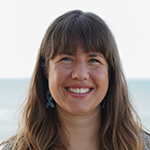 Prof. Anika Bratt
Prof. Anika Bratt
Anika had an exciting year, moving from Charlotte, NC, where she was teaching in the Environmental Studies Department at Davidson College to Minneapolis, MN! Over the last two years at Davidson, Anika taught Urban Ecology, Biogeochemistry, and Introduction to Environmental Science. She also collaborated with students on multiple research projects, from water quality in NC’s Albemarle Sound to urban heat island effects and canopy cover in Puerto Rico. A student-led research project studying how bird richness varied across cities in the southeastern US from class recently publication in Landscape and Urban planning!
Before teaching at Davidson, Anika spent two years at Duke University as a postdoctoral researcher studying how different management styles of yards (e.g. highly manicured, wild-life friendly) influences the birds, bugs, plants, and soil of US cities. She lead a research team focused in Miami, FL. This research is a multi-city, multi-institution project that is ongoing. You can read more about this project at: https://ecologicalhomogenization.com/. A recent publication demonstrated how yards managed for wildlife can support as diverse of bird communities as protected park areas. Another recent publication showed that these wildlife yards also support higher biodiversity of plants compared to lawn based yards.
This fall, Anika is teaching Sustainable Cities: Urban Environmental Science. Student research projects are off to a great start and cover a wide range of topics, from the effect of redlining legacies on water quality to urban heat island effects on algal blooms. In the spring, Anika will co-teach Ecology and the Environment with Dr. O’Connell as well as another section of Sustainable Cities.
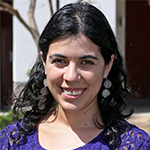 Prof. Sylvia Cifuentes
Prof. Sylvia Cifuentes
Sylvia just moved to St Paul last summer to teach at Macalester, after living with family in Valdivia and Santiago de Chile, and in Quito, Ecuador over the past year. She also completed her PhD in Global Studies over the summer! She focused on finishing her dissertation last year, which illustrates how Amazonian Indigenous organizations and climate initiatives incorporate ontological and territorial politics, ancestral knowledges, and the agency of more-than-human beings from local scales to global climate politics.
In addition to her own research, Sylvia collaborated with other research projects and initiatives at the University of California, Santa Barbara, where she completed her PhD. As a Research Fellow of the Environmental Justice/Climate Justice Research Hub, she led a group of graduate students who organized the series of webinars: “A Wakeup Call for Climate Justice? Indigenous Knowledges Respond to the Coronavirus Pandemic”. This series invited Indigenous scholars, activists, and healers from India, the Ecuadorian Amazon and California to discuss the links between climate justice and resilience to pandemics. She also worked with her advisor in projects about lithium extraction and the Rights of Nature in Chile. Last year, Sylvia taught Social Movements in the Global South at Pitzer College.
This fall, Sylvia is teaching Global Environmental Justice and Global Climate Politics. The former analyses the justice dimensions of global environmental challenges, as well the diverse definitions of justice that inspire different social movements and collectivities. The latter course surveys global climate politics and its different definitions, mechanisms, and actors, with an emphasis on Indigenous climate action. In the spring, Sylvia will teach those courses again, in addition to “Amazonia at a Tipping Point,” which will critically analyze the historical patterns of colonization, development, and destruction that have taken place in the region. It will also focus on Amazonian Indigenous geographies and politics, including in response to contemporary challenges like climate change, extractivism, and biodiversity conservation.
 Prof. Jerald Dosch
Prof. Jerald Dosch
This fall Jerald is started his 18th year at Macalester with continuing roles in both the Environmental Studies and Biology Departments as well as continuing to serve as Director of Macalester’s Ordway Field Station. His 2021-22 teaching schedule includes Outdoor Environmental Education (co-taught with Ruthanne Kurth-Schai in Educational Studies) as well as Ecology and the Environment.
Jerald spent this past summer working at Ordway conducting ecological research and land management activities. He’s looking forward to the opportunity to share those experiences with Macalester students again in the summer of 2022 after two years of not being able to work with students due to the pandemic. Jerald was a co-author on three papers published in 2020 and one in 2021.
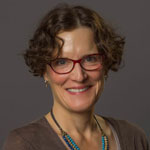 Prof. Christie Manning
Prof. Christie Manning
Christie is Macalester’s Director of Sustainability and is on sabbatical leave for Fall 2021.
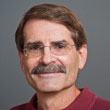 Prof. Dan Hornbach
Prof. Dan Hornbach
Dan continues working half-time through Macalester’s phased retirement program. His half-time work is focused mainly on various aspects of research. Dan spent the past summer working with folks from the Saint Anthony Falls Laboratory at the University of Minnesota, testing whether they can use side-scan sonar to detect and quantify the number of zebra mussels or native mussels in lakes and rivers. The hope is that will make the detection of invasive species more efficient and may allow for the monitoring of native mussel communities over long periods of time.
Dan was also able to publish some information on the differences in decay rates of native and invasive leaves from trees and bushes in both terrestrial and aquatic systems. Since leaf material is a vital source of nutrition for a variety of animals, knowledge of the impact of invasive species on the availability of these foods is crucial for conservation efforts. Jerald Dosch worked with him on this and they had colleagues at nine other liberal arts colleges from the east and Midwest that also replicated this research. It was great fun working with folks from a number of institutions.
With the pandemic Dan didn’t get to visit his grandkids as much as he would have liked. He has one in Chicago and four in NC. Hopefully as more folks get vaccinated and with the availability of vaccines for children improving, he’ll be able to get back to more regular visits.
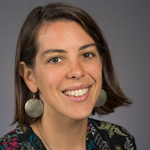 Prof. Christine O’Connell
Prof. Christine O’Connell
Christine continued her research work this past year on a set of projects investigating how global change impacts tropical forest ecosystems. She’s involved in an upcoming drought manipulation experiment at the Luquillo Long-Term Ecological Research Station in Puerto Rico, and submitted a grant to the Department of Energy with collaborators at TRACE, an ecosystem warming experiment based within the El Yunque National Forest, Puerto Rico. She also continued analyzing data and writing papers from a project looking at how Hurricane Maria impacted carbon storage and forest functioning in a rainforest in eastern Puerto Rico and, more generally, how more frequent hurricanes might change tropical forests.
In the classroom, Christine spent 2020-21 modifying the core course Ecology and the Environment for online learning, co-teaching Global Change Biology with Prof. Mary Heskel in Biology with an eye on science communication, and teaching Ecosystem Ecology, an upper division lab course that involves a super cool independent project. This fall, she’s teaching Agroecology and Big Data in Ecology. Agroecology has been able to visit Common Harvest organic vegetable farm twice this semester! And Big Data in Ecology is a project-based course in which students play a large role in defining their own growth goals. To prep for Big Data, Christine attended two summer workshops, the “Culturally Relevant Education in Environmental Data Science (CREEDS) Workshop,” which addressed how to incorporate environmental justice and anti-racism into environmental data science courses, and “Reproducible Research Techniques for Synthesis” at NCEAS. In the spring, look for Christine in Ecology and the Environment and Ecosystem Ecology!
 Prof. Roopali Phadke, Chair
Prof. Roopali Phadke, Chair
Roopali is completing her third year as department chair. In addition to connecting with new majors, she has been teaching Energy Justice and the senior capstone course (Environmental Leadership Practicum) this Fall. She has also been able to dip back into her research this past summer on the future of the Mississippi River. It was exciting to have a summer research lab up the running again, with the help of Alexandra Jabbarpour, Rebecca Driker-Ohren and Zella Lobo. You can read about more about their Dear River project in this Mac Today story.
Roopali and Louisa will also venture to the UN Climate Summit (COP26) this November with other Macalester colleagues and students. You can follow their adventures through the ES department’s social media channels.
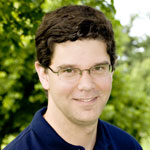 Prof. Chris Wells
Prof. Chris Wells
Chris returned from his 2019-2020 sabbatical travels earlier than planned, swapping travel for quarantine, kids “going” to school on the couch via iPads, and teaching in a virtual classroom. If he’s honest, he preferred sabbatical. He must also, however, admit that he had fun learning how to lecture to a GoPro on a selfie stick, using green screens to play practical jokes on his students, and finding that you can have a pretty great class discussion using Slack. It was a hard year, but he’s endlessly impressed by Macalester students and somehow, amidst all the Very Bad Things, he always felt like he’d won the lottery getting to continue to work with them every day. Somewhere in there he managed to put the final touches on a book that he’s co-editing with George Vrtis, the environmental historian at Carleton, called Nature’s Crossroads: The Twin Cities and Greater Minnesota, which will appear sometime next year in the History of Urban Environments series at the University of Pittsburgh Press. This fall he is teaching a new first-year course, Introduction to Sustainability, along with Environmental Classics, US Environmental History. In the spring he will teach two research seminars, US Urban Environmental History and Imperial Nature: The US and the Global Environment.